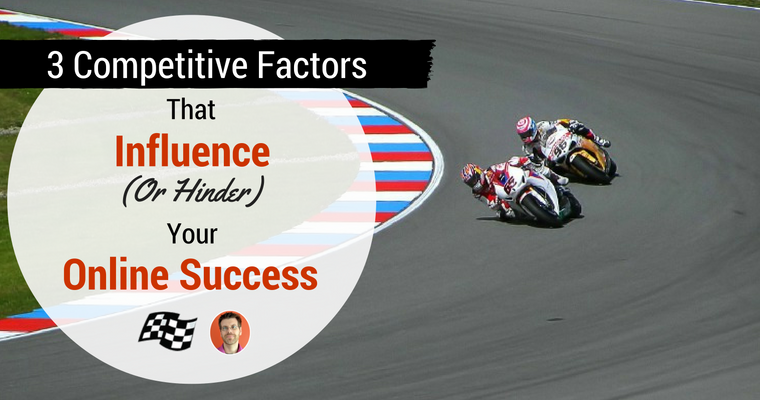Competitive knowledge is an important part of building a successful digital marketing campaign. While the actual optimization of your website can be competitor agnostic, the performance of that optimization isn’t.
Simply monitoring competitors is not enough. And it’s more than collecting data and numbers. You have to understand what all it means. Analytics is great, but if you don’t know what to do with the data, it’s pointless. The same is true for competitive knowledge.
Let’s look at three competitive factors that you need to review, assess, and understand if you want to build a web marketing campaign that outperforms your competition.
Factor #1: The Four Types of Competitors You Need to Keep an Eye On
1) Offline Competitors
Many businesses–especially those that were around pre-internet–have a fairly good grasp on the offline competition around them. After all, before the internet, that’s all there was. But many newer businesses forget to look at these competitors. It’s important for them to realize that failure to do so will affect their long-term success.
Any competitor who is not online today can certainly be online tomorrow. They may be only a minor threat at first, but as soon as they begin to invest, that threat just got real, yo.
Don’t wait until the competition gets fierce before you begin to lay the groundwork for building your own online empire. It’s always better to force someone else to play catch-up to you than you to them.
2) Organically Ranked Competitors
Many businesses tend to discount online competition that they feel is relatively weak in their space. But here’s the thing: Anyone ranking for your keywords is a clear and present danger to your success. It doesn’t matter if they don’t compete for the same customers as you. What does matter is they are currently ranking where you want to be ranked.
It’s always a good idea to run some keyword searches to see what kind of businesses, blogs, forums, etc., are holding those top spots. Where your offline competition may truly be competing for your customers, these online competitors are competing for searcher attention. And you won’t get it as long as they are showing up and you are not.
“It’s important to note that these are not necessarily limited to companies or websites that offer the same type of content, services, or products that you do, but can be any website that competes with you in the search results for your target keywords.” — Moz
Of course, you may find genuine competition in this space as well, which means they won’t give up those spots easily. You’re going to have to work for them.
3) Paid Ad Competitors
Even if you’re not venturing into paid ads, you can learn a bit from those who are investing in getting paid listings for your keywords. There are two reasons for this:
- If you’re not investing in PPC, you’re leaving money on the table. Simultaneously investing in paid and organic marketing provides far more exposure and traffic than you’d get running either of those independently. As long as people click on ads, you won’t get those clicks unless you’re paying for those positions.
- Understanding how your competitors are investing in PPC allows you to get a sense of how aggressive they are in total. You specifically want to look at keywords and estimated ad spend. If you see big PPC ad spend, you can count on the fact that they will likely begin focusing some efforts on the organic side of things as well.
4) Startup Competitors
Startups can fall into any of the categories above, but it’s good to keep an eye on them. Start-ups tend to enter the game with investment money. That allows them to come out of the gate doing far more than you ever dreamed. These deep pockets give them a distinct advantage. While many startups flame out, they can take a big chunk of potential business away from you long before they do.
Factor #2: The Five Ways Competitors Impact Your Digital Marketing Footprint

1) Competitor’s Brand Authority
Every competitor–yourself included–has a certain amount of brand authority built-in. Any competitor’s authority that exceeds yours is a formidable foe. Not only do you need to match their authority level, but you also need to exceed it. I liken this to two cars on a race track. However far ahead they are, you need to catch them before you can beat them.
2) Competitor’s Focus/Niche
Not every competitor you face will compete head to head. You might only offer a fraction of the products/services they offer, and others might offer a fraction of the products/services you do. There are downsides to both.
The bigger the brand, the more opportunities they have to build authority and dominate across all products. However, niche competitors can also zero in on a single product or area and focus all their energies there to dominate it.
Either way, you have to build the authority necessary to compete with the big brand while being laser focused to dominate in your niche.
3) Competitor’s Content
Content is a big part of online marketing and is a great way to build brand authority. Even if your competitor isn’t a brand name today, if they keep publishing both valuable and helpful content, it’s only a matter of time before that earns them some digital respect.
That doesn’t mean you have to out-publish them on a quantity scale, but you will have to find a way to make sure you’re providing equal or better value to your audience.
4) Competitor’s Overall Presence
Look at your competition’s overall web presence. Not just rankings, but social content and engagement as well. Social media consumes a lot of time, but it pays dividends. More than ever, customers are looking to engage with brands. If your competitors are there and you’re not, they are winning the hearts and minds of would-be customers.
5) Competitor’s Depth of Marketing Investment
Online marketing investment comes in many forms: Paid ads, social engagement, content publishing, organic optimization, etc. You can learn a lot about your competition by seeing how much they are doing in each of these areas. A weak competitor will be difficult to find, which is an opportunity for you. But any competitor that is showing significant investment in all these areas will prove to be stiff competition indeed.
Factor #3: The Two Ways Your Success Is Influenced (or Hindered)

1) The Level of Your Success
Unless a competitor flames out, you will never overcome them by doing less. That doesn’t mean working harder, but it does mean working smarter. And that very well may require working harder.
You don’t need to match everything a competitor does point for point. But you do need an effective strategy that takes these factors into consideration. Even if you catch their pace strategically, that will only keep you from losing ground. If you want to gain ground, you have to match and beat them at their own game.
2) The Immediacy of Your Success
Working harder and smarter than your competition doesn’t mean you’ll overtake them immediately. Or anytime soon, for that matter. It all depends on how long they’ve been in the race before you started, and how much better you are doing at your online marketing than they are.
If you’re barely doing more, or barely doing better, it’s going to take a while to catch up. It could be years. But the more in you invest in online marketing (and I don’t just mean dollars; I mean a smart strategy as well) the less time it will take to catch up. But again, how much time depends on how far ahead they are.
Every good digital marketing strategy should be taking all of these factors into consideration. And then there needs to be some communication with the higher-ups to ensure everyone is on the same page, defining what success looks like and when it can be expected.
As they say, failing to plan is planning to fail. Failure to build a strategy that considers your competition will ultimately lead to a failing web marketing strategy overall. Web marketing is a race that can be won. You just have to know what it takes to win it.
Source: https://www.searchenginejournal.com/3-competitive-factors-influence-hinder-online-success/176978/



